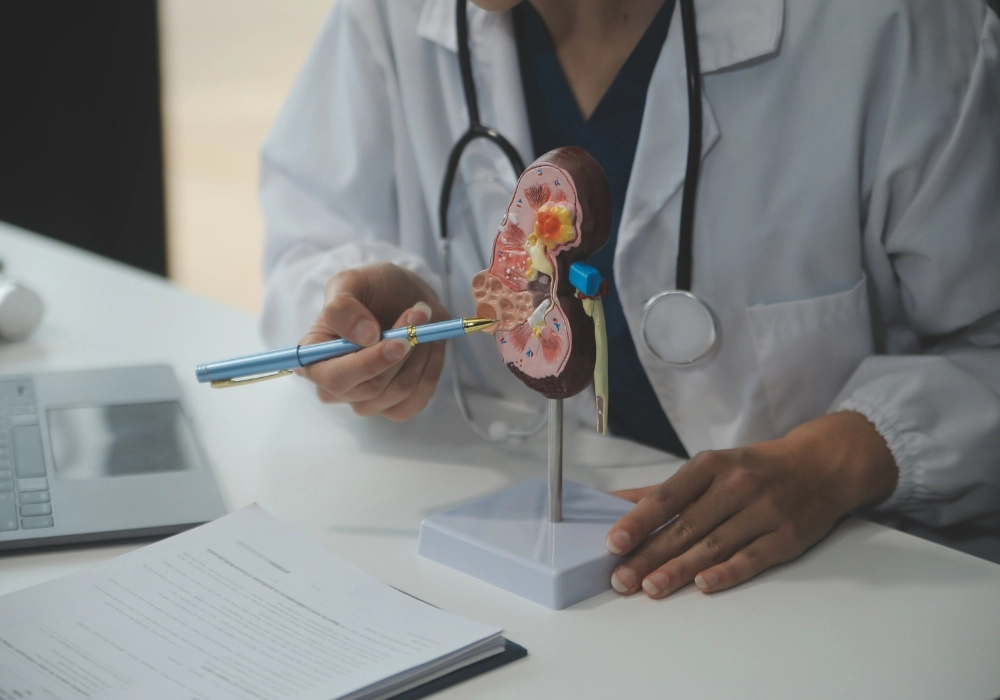A nephrectomy is the surgical removal of one or both kidneys. It is performed for several reasons, including kidney cancer, severe kidney injury, or conditions like polycystic kidney disease that damage kidney function. There are two main types of nephrectomy: partial and total. In a partial nephrectomy, only the diseased part of the kidney is removed, leaving the healthy portion intact. A total nephrectomy involves removing the entire kidney, and in some cases, both kidneys.
One of the key goals of a nephrectomy is to treat kidney diseases or injuries that are not responding to other treatments. The procedure can be lifesaving, especially in cases of kidney cancer where removing the affected kidney can prevent the spread of the disease to other parts of the body.
There are two main approaches to performing a nephrectomy:
- Open Surgery: The surgeon makes a large incision in the abdomen or side to access the kidney.
- Laparoscopic Surgery: This minimally invasive technique uses small incisions and a camera to guide the surgeon in removing the kidney, leading to quicker recovery and less pain.
Patients requiring a nephrectomy often undergo a thorough evaluation to determine whether they are candidates for partial or total kidney removal. Factors like the extent of kidney damage, the presence of tumors, and the patient’s overall health all play a role in deciding the appropriate procedure. For those who undergo partial removal, the remaining kidney tissue often compensates for the loss, maintaining near-normal kidney function.
The recovery time for a nephrectomy depends on the type of surgery performed and the patient’s overall health. Laparoscopic surgeries generally offer quicker recovery times, while open surgeries may require a longer hospital stay. Post-surgical care includes monitoring kidney function, managing pain, and following a kidney-friendly diet to ensure optimal recovery.
There are different types of nephrectomy, each suited to specific medical conditions and patient needs. Understanding the differences between them can help patients feel more informed and prepared for their surgery.
Partial Nephrectomy
A partial nephrectomy involves removing only the diseased or damaged part of the kidney, preserving as much healthy tissue as possible. This procedure is often recommended when only a portion of the kidney is affected by conditions like tumors or localized kidney damage. A partial nephrectomy is typically chosen when preserving kidney function is important, especially in patients with only one functioning kidney or those at risk of future kidney disease.
The advantages of partial nephrectomy include:
- Preservation of kidney function
- Lower risk of chronic kidney disease after surgery
- Shorter recovery times compared to total kidney removal
Total Nephrectomy
In a total nephrectomy, the entire kidney is removed. This procedure is often necessary in cases of widespread cancer or severe kidney damage that cannot be treated with partial removal. For patients with only one functioning kidney, a total nephrectomy may require a future kidney transplant or dialysis to maintain health.
While a total nephrectomy can be life-saving, it may also lead to reduced kidney function if both kidneys are removed, and lifelong monitoring will be needed.
Radical Nephrectomy
A radical nephrectomy goes beyond just removing the kidney. In this procedure, the kidney, surrounding tissue, and nearby lymph nodes are removed, usually to treat kidney cancer that has spread beyond the kidney itself. This more aggressive form of nephrectomy is often chosen when there is a higher risk of the cancer spreading.
The surgical approach (open vs. laparoscopic) varies depending on the complexity of the case and the surgeon’s recommendation. Laparoscopic nephrectomy typically results in less pain, fewer complications, and a faster return to normal activities.
A nephrectomy is usually performed for specific medical reasons, and understanding these indications helps patients comprehend why this surgery is necessary. The most common conditions requiring a nephrectomy include:
- Kidney Cancer: One of the leading reasons for a nephrectomy is the presence of malignant tumors in the kidney. Removing the affected kidney can prevent the cancer from spreading to other organs. Depending on the stage and location of the tumor, either a partial or total nephrectomy may be performed.
- Severe Kidney Injury: Traumatic injuries to the kidney that cause irreversible damage may necessitate the removal of the kidney to prevent infection or other complications. In some cases, only a partial nephrectomy is required to remove the damaged tissue, while preserving the rest of the kidney.
- Polycystic Kidney Disease (PKD): This inherited condition causes cysts to grow in the kidneys, leading to kidney enlargement and loss of function over time. When the cysts significantly impair kidney function or cause pain, a nephrectomy may be recommended to alleviate symptoms.
- Chronic Kidney Infections: Repeated or severe kidney infections that do not respond to antibiotics may result in scarring and permanent damage to the kidney. In such cases, a nephrectomy can prevent further health complications.
For patients considering kidney transplantation in Chennai, it’s important to note that if both kidneys are failing or damaged, a nephrectomy might be a step toward preparing for a kidney transplant. In these instances, the surgery is often paired with dialysis to ensure the patient’s body is ready to receive a donor kidney.
Choosing the right type of nephrectomy depends on the patient’s health, the extent of the kidney damage, and the overall prognosis. Doctors work closely with patients to ensure the best possible outcomes based on individual circumstances.
A nephrectomy procedure is carefully planned based on the patient’s condition, the extent of kidney damage, and the surgeon’s recommendation. There are different approaches to the surgery, but the goal is always to safely remove the kidney or the damaged portion of the kidney while minimizing risks and ensuring a smooth recovery.
The key steps of a nephrectomy procedure include:
- Preparation: Before the surgery, the patient undergoes a series of tests, including blood tests, imaging scans, and sometimes a biopsy. This helps the medical team plan the surgery and ensure the patient is in good health for the procedure.
- Surgical Approach:
- Open Nephrectomy: This involves making a large incision to access the kidney. The surgeon removes either the entire kidney or part of it. Open surgery is typically chosen for larger tumors or more complex cases.
- Laparoscopic Nephrectomy: In this minimally invasive surgery, small incisions are made, and a camera is used to guide the surgeon. This approach reduces recovery time and is less painful than open surgery.
- Kidney Removal: During the procedure, the kidney or the affected portion of the kidney is carefully removed. If a radical nephrectomy is being performed, nearby tissues and lymph nodes may also be removed to ensure all cancerous cells are eliminated.
- Post-Operative Care: After the surgery, patients are monitored in the hospital for a few days to ensure they recover well. They are given medications to manage pain and prevent infections. Depending on the type of nephrectomy, patients may need to follow a specific recovery plan, including a kidney-friendly diet.
The advantages of kidney transplant become especially evident for patients who may require both kidneys to be removed. For those considering kidney transplantation in Chennai, the nephrectomy procedure is a vital step in preparing the body to receive a healthy donor kidney.
Recovery after a nephrectomy varies depending on the type of surgery performed (open or laparoscopic) and the patient’s overall health. However, there are key steps and precautions to ensure a smooth recovery process.
- Hospital Stay: After a nephrectomy, most patients will stay in the hospital for 3 to 7 days, depending on the type of surgery and how quickly they recover. During this time, healthcare professionals will monitor kidney function, manage pain, and ensure there are no complications from the surgery.
- Post-Surgery Care:
- Pain Management: Pain is managed with prescribed medications. Patients are encouraged to move around carefully to prevent blood clots but must avoid strenuous activity for several weeks.
- Wound Care: Proper care of the surgical site is essential to prevent infection. The incision area should be kept clean and dry, and patients should follow specific guidelines provided by their healthcare provider.
- Follow-Up Appointments: Regular check-ups with the healthcare provider are necessary to monitor kidney function and ensure the remaining kidney is compensating well for the loss of the removed kidney.
- Long-Term Recovery: Patients recovering from a nephrectomy should adopt a healthy lifestyle, including a balanced diet, regular exercise, and avoiding smoking and excessive alcohol. If both kidneys were removed, dialysis or a kidney transplant would be required to maintain kidney function.
For patients undergoing kidney transplantation in Chennai, recovery from a nephrectomy is an essential step in ensuring their body is prepared for the transplant. Post-operative care is crucial in achieving long-term success and maintaining good health.






